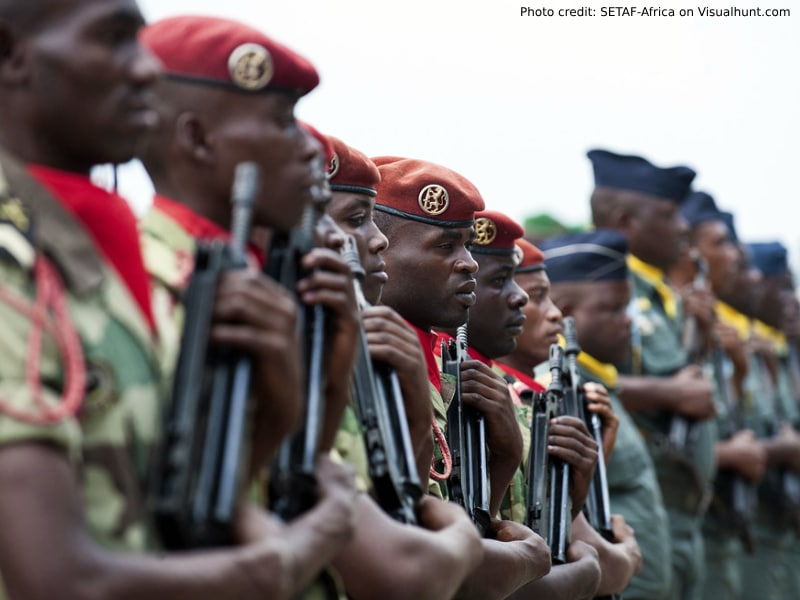
During last week's visit to Cameroon, the leader of the military coup in Gabon, General Brice Clotaire Oligui Nguema, have asked the Central African countries to remove the economic sanctions imposed on this African country after the August coup by the time of the general elections of 2025th year. Namely, the last in a series of military coups in this part of the world was placed on August 30th of this year in the Republic of Gabon, when longtime president Ali Bonga Ondimba has had overthrown. That also ended the 56-year reign of the Bonga family, and the leader of the coup was General Nguema, the man who was the head of the National Guard there. This event preceded by presidential elections where, despite the expectation of the victory of the opposition candidate, the majority of votes (64%) had been won by Ali Bong, which is why many accused him of manipulating the election results in a process that was not fair and transparent.
The tensions surrounding the elections, the atmosphere in society and the election results were precisely the reason for starting the military coup, even although the former president had been initially place under house arrest, he was soon released to travel abroad freely for medical purposes (which is not so often the case when there is violent changes of power). On the other hand, the citizens of this African country provided great and open support to the National Guard general while stood by the coup plot, expecting that one of the first moves would be to sever ties with France, whose colony Gabon was. However, such a scenario did not happen, since, unlike other former French colonies, Gabon immediately after the overthrow of the president and the dissolution of the government, the Committee for the Transition and Restoration of Institutions (Committee for the Transition and Restoration of Institutions) was established, advocating the idea on holding general elections in the country, no later than 2025. Therefore, the question arises who will profit from the recent overthrow of the president, but also under whose influence will the new government be formed?
More than three months after the August events in Gabon, the French army has been still stationing in the capital, Libreville, and although it has reduced the number of its troops from 600 to 400, its soldiers stays spread across the country. However, it seems that those negative effects of the change of government have still an impact on official Paris. Namely, although there are currently slightly more than 100 French companies operating in the mentioned African country, some of them had completely suspended their work until further notice, such as the French mining company Eramet. Its business is extremely important for France, especially considering that of the total imports that are coming from Gabon, as much as 55% is the import of ores. With the suspension of mining, there are opportunities for losing control over mines and access to resources, i.e. handing over mines to companies from other countries. Hence, the statements of French officials who call out calming of tensions and the holding of new elections as soon as the required conditions are met are not surprising. It seems therefore that official Paris shows no intention of leaving this territory in the near future, and the views of France are firmly supported by the European Union.
That supported by the fact that EU leaders criticized the election process, which they characterized as non-transparent and unfair, calling for calming of tension in the country. It is important to emphasize, however, that from 2008 to 2014, this particular African republic was part of the program of the generalized system of preferences, which enabled curtains reductions in tariffs and taxes on imports and exports between the EU and Gabon. After January 1, 2014, Gabon lost its privileged status, and from then until today, the exchange of goods with the EU is such that, according to data from 2022, as much as 80% of minerals and mineral resources have been taken from this African country. By suspending the extraction of ores, it currently puts an end to the further import of resources from the territory of Gabon, which is why it is understandable that the EU has an interest in the normalization relations and the establishment of a legitimate government as soon as possible. On the issue of transparency of elections in Gabon, Washington also stood by France and the EU, which characterized the entire election process as undemocratic. However, immediately after the overthrow of the president, the USA decided to stop sending material aid to this African country, which reflected in mining machines, means of transport, and medical and telecommunication equipment. Although diplomatic relations have not been cited off, official Washington have been advocating the formation of a new government as soon as it is achievable, to continue the current alliance between these two countries.
Observing the atmosphere in the society, it is clearly noticeable that it is strongly anti-French, with open aspirations to reduce its presence and the troops to leave the territory of Gabon. After the violent change of government, the people took to the streets to openly support the putschists, while among the numerous banners and symbols, Russian and Chinese flags could been seened. It opened up questions about the position and relationship of these two countries towards the current events in Gabon, also the attempt to expand and strengthen their influence by displacing France from this region. However, the military authorities, headed by General Brice Oligui Nguema, have so far not expressed an official position on the issue of relations with Russia and China, nor on whether their increased presence will also mean severing the ties with the former Western countries.
As in previous cases, the Russian Federation immediately called for a peaceful solution of the transition of the government with the holding of new, democratic elections. Although it is noticeable that Russian influence on Gabon is deepening, it is not followed by the pattern of direct involvement of the private military company Wagner as was the case with countries like Mali, Burkina Faso, Niger and others. Thus, according to available sources, since 2019, official Moscow has been actively supplying weapons and military equipment to the Gabon army, which many characterized as a potential space for the future presence of Wagner. In addition, at the Russia-Africa summits held in 2022 and 2023, the delegations of two countries signed several agreements agreeing on cooperation in the fields of education, additional supply of weapons and military equipment, the development of nuclear energy as well. However, it seems that an key point of the signed documents is related to the taking over of the mines and the extraction of ores, so gaining control over the mineral wealth would open up space for the expulsion of the French mining companies that have been present in Gabon.
And while on the one hand Russia would take control over the mineral resources, it seems that China would be the main contractor of infrastructure works, because it was with the deposed president Ali Bongo Ondimba that Beijing had an agreement on the construction of a naval base. According to the plan, this strategically important facility was supposed to be builed on the Atlantic Ocean in Mandji, and with its construction, China would gain additional influence on the African continent. In addition, in 2013, China and Gabon signed an agreement on the construction of the modern "Silk Road" (Belt and Road Initiative), which will be reflected in the further connection of African countries and official Beijing. However, the August coup resulted of the suspension of the mentioned base construction project, while the fate of the signed agreements is still uncertain.
More broadly, during the last 20 years, China has given this African country non-refundable loans for the construction of the Gabonese Senate, the national television station, stadiums, roads and many other infrastructural facilities, which seems to have been for no reason. Namely, the official representatives of Gabon supported China in June last year when, at the 50th session of the UN Human Rights Council, together with 68 other countries, they signed a joint statement stating that the issues related to the Chinese province of Xinjiang, Hong Kong and Tibet are internal things of china. Although Gabon's position on the matter has been unchanged for years, the military coup and the resulting changes will inevitably affect the future of relations between the two countries. For now, there are no indications of any changes, and the first steps commence could be expected after the end of the political transition process and holding the general elections scheduled for year of 2025.


